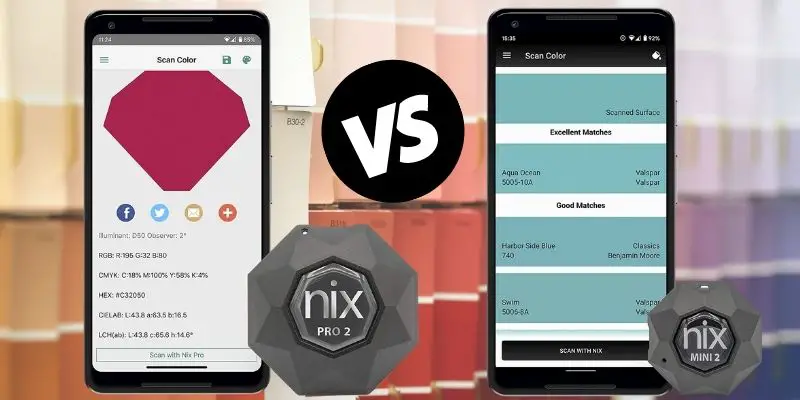As an Amazon affiliate, I earn from qualifying purchases.
In this post, I compare the two best paint color sensors out there: Nix Pro vs Nix Mini. Interestingly, they are made by the same company.
Planning a home improvement project and don’t have time to read my full epic post? Here is the short version:
The first difference that you’ll notice is the size. At 1” x 1.5”, the Nix Mini is the size of a coin, while the Nix Pro 2 is a little larger than a golf ball. Further, the 2.3” x 1.6” Nix Pro 2 boasts higher performance levels than the Nix Mini, showing superior calibration, battery life, importing, and automation.
You can also quickly jump down to learn more about a specific product:
Painting By Numbers
 So many details affect the way we see color, and that’s a difficult problem to overcome for individuals whose roles depend on it. That’s where Nix color sensors come into play. They read analog colors and convert them into digital formats like HEX, CMYK, RGB, and more.
So many details affect the way we see color, and that’s a difficult problem to overcome for individuals whose roles depend on it. That’s where Nix color sensors come into play. They read analog colors and convert them into digital formats like HEX, CMYK, RGB, and more.
Two of Nix’s more affordable options are the Nix Pro 2 and the Nix Mini, but which one is right for you?
If you look at the specs above, the Nix Pro 2 is certainly the more full-featured choice, but that doesn’t mean that the Nix Mini is lightweight. In fact, for most homeowners, the Nix Mini is more than they’ll ever need. While the Nix Pro 2 is superior in almost every category and suits the needs of professional designers.
So, let’s take some time to compare them in-depth, analyzing both color sensors to help you determine which works best for your personal needs.
I’ll start with a comparison table.
Nix Mini and Nix Pro 2: Head-to-Head
In terms of a head-to-head matchup, the Nix Mini can’t compare to the Nix Pro 2, but it’s not designed to, either. The Nix Mini is to the Pro 2 what a Nintendo DS Lite is to a Nintendo Switch.
Both devices are outstanding in their capabilities and execution for the consumer base they directly target.




Last update on 04/18/2025 / Affiliate links / Images from Amazon Product Advertising API
#1 – Nix Mini Paint Color Sensor
One of the biggest features of the Nix Mini is its low price tag. The standard price is low, but you will frequently find it at an even lower price on most online marketplaces such as Amazon. What makes this so outstanding is the number of attributes you’ll find within the Nix Mini.
Features
Below are some of the key features of the Nix Mini.
Mini Review
The Nix Mini is portability personified. Though you’ll want to keep it in a case to ensure it’s well-protected, you could just as easily pocket it and carry it wherever you need to go. It also comes with its own lanyard, giving you the option to hang it around your neck while you work.
The Nix Mini is capable of scanning and matching over 10,000 paint brands. The Nix Paints app (available for iPhone and Android users) contains a massive library of paint brands, and when you scan a paint scheme with the Nix Mini, it is instantly transferred to the app and compared with its database to find the perfect match.
Through the app, the Nix Mini can compare RGB, HTML, CMYK, and LAB colors with enough battery power to complete approximately 3,000 scans before requiring a recharge.
Its also capable of discovering new color palettes and will hold thousands of scans, building your own massive library to match the one embedded in the app. Built with impact-resistant hardware, the Nix Mini can be dropped and kicked, yet it still scans accurately.
The Nix Mini is an exceptional device and critical for homeowners whose needs for color accuracy are crucial to their projects.
Video Review
Video credits PaintAccess.com.au
Pros:
Cons:
#2 – Nix Pro 2 Paint Color Sensor
The Nix Pro 2 is significantly more expensive than its Nix Mini counterpart. However, you get far more features for that price than the Mini can carry. It is more expensive, but like the Mini, these often go on sale at Amazon.
Features
Below are some of the key features of the Nix Pro 2.
Pro 2 Review
The major feature upgrades that set the Nix Pro 2 apart from the Nix Mini are longer battery life, a larger color library, the addition of Delta E equations, a new Pro app, and more options for sharing and exporting data.
The Nix Pro 2 is calibrated in-house, and the company claims that it will show no significant levels of drift for a minimum of five years due to its resistance to aging effects. That’s a long time for such a precise calibration, and it can detect color values through sRGB, CIELAB, CMYK, HEX, LCH, XYZ, ACES, ACEScg, and Linear sRGB.
The Pro app is highly customizable, making it incredibly convenient for professionals who would use this tool frequently on a number of different projects. It accurately matches colors and even provides complementary colors for each one of your scans.
While it’s primarily designed for architects, interior designers, color consultants, and print technicians, there’s plenty to love here for homeowners and interior and graphic designers. Like the Mini, the Pro 2 uses a native illumination of D50 2°, so you’re getting an incredibly accurate, native light for the best possible scan.
Pro 2 also uses the Delta E equation DE2000 to analyze colors through multiple changes in visual perspective to get a precise analysis of the color you’re scanning.
Pros:
Cons:
Video Review
Video credits swashin
Final Thoughts
As you can see, the ultimate decision on which color sensor to choose comes down to what you need the device to do. However, if you’re a designer, your profession most likely requires a significant number of scans with customization and export options as well as analysis of multiple changes in visual perspective. The Nix Pro 2 has your needs covered.
If you’re a homeowner, though, your needs won’t be on the same grand scale. You’ll want effortless portability and social media sharing while still having the option to make several high-quality scans before a recharge. The Nix Mini will be a solid decision for you.

Tim Brennan, a tech blogger and host of the @TecTimmy YouTube channel, writes about smart homes at oneSmartcrib, home theaters at UniversalRemoteReviews, and AI in writing at Writeinteractive. He holds a Journalism degree from Northeastern University and has covered technology for three decades. He lives on the ocean in Nahant, Massachusetts.
Please subscribe to my YouTube channel for a fun take on all things tech.



